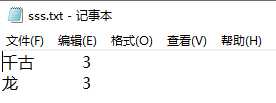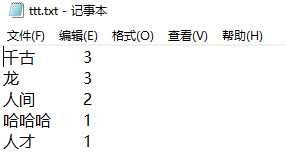标签:jieba分词 文件 inf items style port 导入 pytho ons
# -*- coding: utf-8 -*- #spyder (python 3.7)
1. 统计字符(可以在jieba分词之后使用)
from collections import Counter from operator import itemgetter # txt_list可以写成函数参数进行导入 txt_list = [‘千古‘,‘人间‘,‘人间‘,‘龙‘,‘龙‘,‘龙‘,‘哈哈哈‘,‘人才‘,‘千古‘,‘千古‘] c = Counter() for x in txt_list: if len(x) >= 1: if x == ‘\r\n‘ or x == ‘\n‘ or x == ‘ ‘: continue else: c[x] += 1 print(‘常用词频统计结果: \n‘) for (k, v) in c.most_common(4): #打印排名前四位 print(‘%s%s %s %d‘ % (‘ ‘ * (3 ), k, ‘*‘ * 3, v)) # 按照词频数从大到小打印 d = sorted(c.items(),key=itemgetter(1),reverse = True) for ss,tt in d: out_words=ss + ‘\t‘ + str(tt) print(out_words)
2. 多次覆盖,循环写入文件
#写入文件,多次写入,后一次覆盖前一次,但是out_words本身是在叠加的 #即:第一次写入的是:千古\t3\n;第二次写入的是:千古\t3\n龙\t3\n,覆盖上一次的数据; #第三次是:千古\t3\n龙\t3\n人间\t2\n,继续覆盖上一次的数据 out_words = ‘‘ for ss,tt in d: out_words=out_words + ss + ‘\t‘ + str(tt) + ‘\n‘ with open(r".\sss.txt", "w",encoding=‘utf-8‘) as f: f.write(out_words+‘\n‘)
比如,循环两次的结果是:

3. 一次性写入文件,中间不会覆盖和多次写入;但是如果重复运行代码,则会覆盖之前的全部内容,一次性重新写入所有新内容
out_words = ‘‘ for ss,tt in d: out_words=out_words + ss + ‘\t‘ + str(tt) + ‘\n‘ with open(r".\ttt.txt", "w",encoding=‘utf-8‘) as f: f.write(out_words+‘\n‘)

Python统计字符出现次数(Counter包)以及txt文件写入
标签:jieba分词 文件 inf items style port 导入 pytho ons
原文地址:https://www.cnblogs.com/qi-yuan-008/p/11688911.html